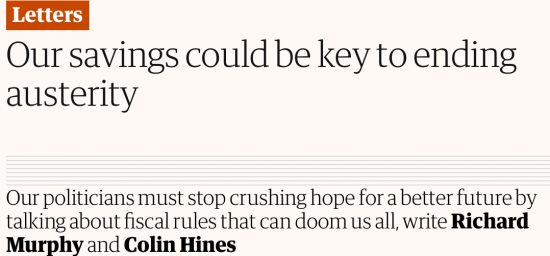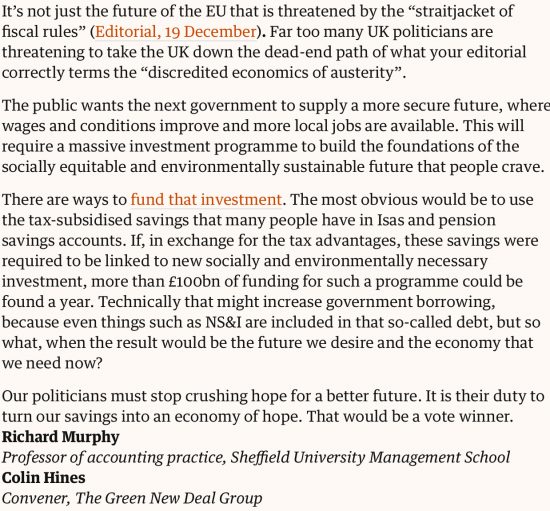Colin Hines and I have a letter in The Guardian this morning under this headline:

The letter says:

If only….
I will keep talking about this. It is absurd that savings are never discussed as a source of capital for the investment we need. It is the massive missing part of the equation that makes the economics of the future possible.
PS And congratulations to Colin on becoming a grandparent to Ava Rose on Christmas Day. It's for people like her that we will keep on banging on.
Thanks for reading this post.
You can share this post on social media of your choice by clicking these icons:
You can subscribe to this blog's daily email here.
And if you would like to support this blog you can, here:



I can’t think of any reason savings should not be used in this way. Unfortunately, I can’t see any of the main parties taking up the idea any time in the near future.
It ought to be a vote winner, but in the unlikely event of it becoming Labour Party policy before the election, I’m certain the Tory press would do its damnedest to try to discredit the idea. The Labour front bench would have to argue robustly in its favour and I’m not sure it has either the expertise or the courage to do that.
I wish I could disagree with you
I am wondering what would stop a Tory government from using these resources to fund Freeport’s & the special economic zones they want to pursue? This will be mis-sold & misused by them to destroy local democracy, all public services & replace them with private provision that will be resold back to the public. Expensive. No choice. No joined up services. All funded by our government via our work & taxes and paid in subs to private companies & huge corporations as sweeteners, whilst they pay their shareholders, but no taxes back into our economy. Extreme free enterprise, no regulation, worker protection & people forced to buy the services that these profit, asset strippers profit further from by selling public services back to us.
People would stop contributing
I was involved in pivotprojects.org and we asked ourselves a concomitant question: what needs investing in for society to be sustainable. The answer was infrastructure. However, we quickly realised that a lot of infrastructure installed drives both spending and profits whilst using up resources. Let me explain: a giant retail park means people need to travel to get there, and economies of scale mean centralized purchasing and more goods transport.
Water supply and treatment are similar. Huge amounts of chlorine, iron filings, pumping, etc. But they do mean the investors can cream off dividends.
There seems to be a mind-set with civil servants that unless everything is constructed as a business model that favours shareholders ( rather than simply providing decent wages, like a family business or cooperative) they are not willing to back it.
Coming back to your letter in the Guardian, the money might be there, but the system encourages investing in existing assets and listed company “killings”.
So, we need to change that culture
I am totally with you there, Richard. Are there som tax interventions, like hard constraints, that could be applied to shift investment from existing assets to sustainable infrastructure? What would that culture look like?
See https://taxingwealth.uk/2023/11/30/reforming-the-conditions-attached-to-pension-tax-relief-could-release-35-billion-a-year-for-investment-in-a-uk-green-new-deal/ and https://taxingwealth.uk/2023/11/20/the-reform-of-the-use-of-isa-funds-could-result-in-the-saving-of-at-least-3-7-billion-of-tax-subsidies-a-year/
Great that Guardian published it.
Maybe some of Labour’s front bench can read?
Maybe some of them can even read the Guardian..?
Maybe.
Maybe…
I thought it was you involved in this when I read the overview of the rag, and I’m glad it was you.
Well done.
Thanks
OK, super, lovely. Now, how do those investments in green and local things make money? What’s the return to the investment?
No, not what’s the benefit to society at large, to the cutlure, not even to the commissars who get to run it. What’s the return that the investors manage to capture? What’s the interest payment, the dividend, the profit stream, thrown off by those investments which then flows to the investors?
Without that there’s no investment to be made of course. Further, with that then why does there need to be any direction or forcing of investment?
Who pays how much to the investors for these investments? Solve that and you might actually solve the problem. But what’s the one thing you never do talk about?
It’s interesting to note that your name was Mary on Christmas day, but let me presume you8 have a dual identty (because I am generous, before blocking you) and will answer your fatuus question.
Tell me this:
1) Is there a return on building sustainable housing?
2) And a eturn ion renewable energy equipment?
3) Or the creation of transport infrastructure rented to the user?
4) Or on the supply of sustainable buildings to goverbment?
I think you’ll find that there is. In that case it’s really not hard to work out where returns come from, is it?
So if the returns are so attractive, why do investors need to be compelled to invest?
Because the market needs to be created and right now regulation prevents that happening
It is the supposed free market that is squeezing out what is required because it has captured regulation. Ironic, isn’t it?
There may well be a return on those investments, but you are asking us to take the risk that it is at least the same as the investments that we choose to make and on which we have based our retirement plans. After 50 years working and saving I’d prefer to take my own investment decisions.
Perhaps if you are so confident you could get the pension industry to set up a fund and let people invest voluntarily?
And before you reply, I am aware of your arguments that some of my pension and savings was tax free on the way in and has been earning tax free interest. That’s the deal we had with the government at the time and retroactive legislation is always a bad idea because it destroys trust in government and that is already at an all time low.
You mean those investment decisions that are destroying the planet?
Politely, stop being a) stupid b) so self centred that you think the state must subsidise your stupidity and c) so lacking in observational power that you cannot see that there is not an iota of compulsion about this. No money has to take a state subsidy to save.
“not an iota of compulsion”
What part of the word “required” is hard to understand?
Required if you want tax relief
No one is compelled to have tax relief
It’s staggering that you seem to think you have a right to it
Negative externalities? (as economists call them).
You be able to make a fortunate in an investment but is it fair to leave the rest of us saddled with the result? No.
What regulation is STOPPING people investing in ESG friendly investments? Answer: None.
People, making a choice as to what suits them, do not want to invest in these investments, presumably because the risk-return trade-offs are not suitably stttractive. Why should they be forced to do so for their retirement savings when other people are not forced to make the same investments.
There is not an iota of compulsion in what I suggested. You made that up. All I am saying is that the state should only subsidise socially beneficial saving. What his your objection to the prudent use of public funds? Please explain.
Anyone wanting to save in any other way will be free to do so, but without tax relief. This is what freedoms and prudent government looks like. Why are you objecting?
Wow, that was an unwarranted and gratuitous reply to some genuine questions. I can now see why you have earned your reputation as intemperate and thin-skinned.
You mean I have a reputation for treating trolls as incompetent time wasters?
Looking back then.
In the UK we developed Building Societies whose purpose was to provide Mortgages for home buyers.
Conversely the rest of Western Europe developed Savings Banks to provide funding for local industry & business. Unlike the UK this happened as a matter of Government Policy, largely because unlike the UK the rest of the world had the Industrial Revolution as a matter of Government Policy rather than by accident and unlike the UK they only had limited capital so needed to make good use of what they had.
Now what Richard is proposing isnt radical its what the rest of what is now the developed world did over a hundred years ago.
As with the building society movement what is needed is the hardly radical idea of creating savings products that the public want to put their money in.
Imagine 2023
Imagine a world
Where love was scintillating
And empathy was as tough as a rough gnarled branch
On an old and beautiful tree
Imagine a world
Where hate was nauseating
And despair was as brief as a condensed outward breath
On a cold and frosty day
Imagine a world
Where truth was resonating
And understanding was as strong as a long beam of steel
On a bridge across a deep divide
Imagine a world
Where hope was captivating
And yearning was as bright as hot fire burning
On a bonfire of failed political pledges
Imagine a world
Where solidarity was intoxicating
And dreaming was as easy as peasy and sweet fruit
On a dewy orchard Autumn morning
Imagine a world…